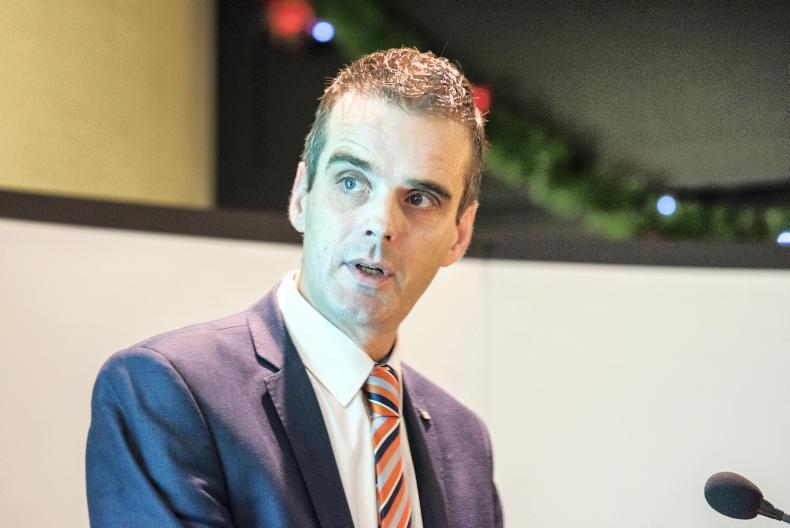“I was talking with a farmer recently who had his jeep stolen. He told me that the biggest thing for him was that when he was down in the yard his daughter used to follow him,” says Joe Healy. “At the back of his mind he was thinking: ‘Are they watching even when my daughter and my other kids are coming down to the yard?’”
“The security you feel in your own place comes into question. When you have been burgled that is taken away. He said to me that is a lot more difficult to get over than the theft of the jeep.”
Many victims of rural crime feel the same way, and it’s something Joe Healy comes across regularly when talking to IFA members acround the country.
“No matter what meeting I go to, whether it’s a county executive, a branch meeting or at the launch of a show, it invariably comes up in conversation,” Healy says.
“We hear about trailers being taken, we hear about quads being taken, we hear about break-ins to farmers’ sheds. There are so many different items that can be stolen or taken at your dead ease and they are away again out of the yard,” he adds.
With almost 30,000 farm-related crimes between 2010 and early 2016, it is hardly surprising that Healy gets frequent requests to address the problem.
Both the loss of the stolen items and the financial burden of putting crime-prevention measures in place are a very bitter pill for farmers to swallow.

The IFA response
“We have been constantly lobbying for extra gardaí and supervision in rural areas,” says Healy.
“All we can do as an organisation is to continue to lobby for extra resources, continue to highlight Theft Stop and create an awareness among rural people on what should be done.
“We need to create awareness and a new community spirit towards highlighting strange activity in an area.”
Theft Stop
Theft Stop is a joint initiative undertaken by An Garda Síochána and the IFA.
It aims to reduce the likelihood of rural crime by placing a unique code on a farmer’s machinery, which will deter theft and allow a farmer to identify property which has been stolen.
It came in response to the explosion of rural crime, where annual figures were showing farm-related thefts peaking at 5,000 per annum.
Theft Stop was needed. But has it been successful?
The general consensus on Theft Stop seems to be that while the idea is imaginative and required, its performance hasn’t been as fruitful as expected.
“I think it has been quite successful. But it is like all initiatives you run, you would like it to be more successful.
“It has been successful in so far as making farmers conscious of the need to lock the door of the shed, lock the gates and install a camera,” Healy explained.
Local knowledge
The idea of local knowledge being a factor in who is targeted by crime hits farmers hard. When a person in the local area scouts out farmers, the crime becomes more personal.
“Unfortunately, very often when we see issues being solved, we see a fair deal of local knowledge feeding into the people in question.
“It’s unfortunate that local knowledge allows them to known the quickest way to get in and the quickest way to get out. It’s a pity that is happening, but it is happening.
“The thought of someone being in your home is worse than the theft itself,” Healy says.
Read More
Do you recognise these stolen tools?
Power of social media sees stolen tractor recovered
’Car-boot sale culture driving rural thefts’ – midlands crime victim
Full coverage: rural crime
“I was talking with a farmer recently who had his jeep stolen. He told me that the biggest thing for him was that when he was down in the yard his daughter used to follow him,” says Joe Healy. “At the back of his mind he was thinking: ‘Are they watching even when my daughter and my other kids are coming down to the yard?’”
“The security you feel in your own place comes into question. When you have been burgled that is taken away. He said to me that is a lot more difficult to get over than the theft of the jeep.”
Many victims of rural crime feel the same way, and it’s something Joe Healy comes across regularly when talking to IFA members acround the country.
“No matter what meeting I go to, whether it’s a county executive, a branch meeting or at the launch of a show, it invariably comes up in conversation,” Healy says.
“We hear about trailers being taken, we hear about quads being taken, we hear about break-ins to farmers’ sheds. There are so many different items that can be stolen or taken at your dead ease and they are away again out of the yard,” he adds.
With almost 30,000 farm-related crimes between 2010 and early 2016, it is hardly surprising that Healy gets frequent requests to address the problem.
Both the loss of the stolen items and the financial burden of putting crime-prevention measures in place are a very bitter pill for farmers to swallow.

The IFA response
“We have been constantly lobbying for extra gardaí and supervision in rural areas,” says Healy.
“All we can do as an organisation is to continue to lobby for extra resources, continue to highlight Theft Stop and create an awareness among rural people on what should be done.
“We need to create awareness and a new community spirit towards highlighting strange activity in an area.”
Theft Stop
Theft Stop is a joint initiative undertaken by An Garda Síochána and the IFA.
It aims to reduce the likelihood of rural crime by placing a unique code on a farmer’s machinery, which will deter theft and allow a farmer to identify property which has been stolen.
It came in response to the explosion of rural crime, where annual figures were showing farm-related thefts peaking at 5,000 per annum.
Theft Stop was needed. But has it been successful?
The general consensus on Theft Stop seems to be that while the idea is imaginative and required, its performance hasn’t been as fruitful as expected.
“I think it has been quite successful. But it is like all initiatives you run, you would like it to be more successful.
“It has been successful in so far as making farmers conscious of the need to lock the door of the shed, lock the gates and install a camera,” Healy explained.
Local knowledge
The idea of local knowledge being a factor in who is targeted by crime hits farmers hard. When a person in the local area scouts out farmers, the crime becomes more personal.
“Unfortunately, very often when we see issues being solved, we see a fair deal of local knowledge feeding into the people in question.
“It’s unfortunate that local knowledge allows them to known the quickest way to get in and the quickest way to get out. It’s a pity that is happening, but it is happening.
“The thought of someone being in your home is worse than the theft itself,” Healy says.
Read More
Do you recognise these stolen tools?
Power of social media sees stolen tractor recovered
’Car-boot sale culture driving rural thefts’ – midlands crime victim
Full coverage: rural crime







 This is a subscriber-only article
This is a subscriber-only article









SHARING OPTIONS: